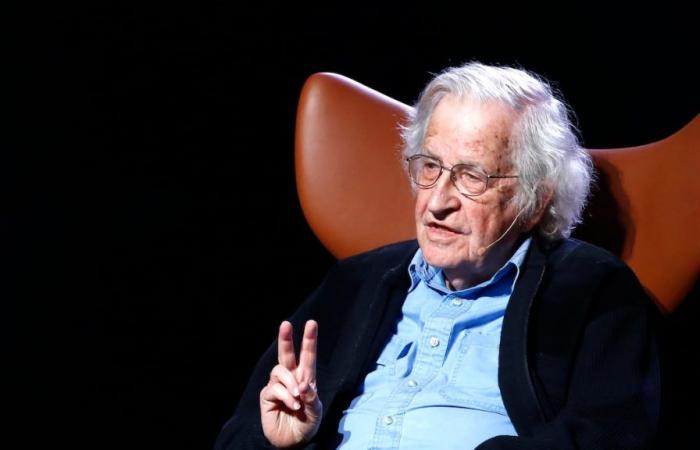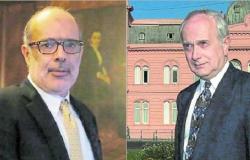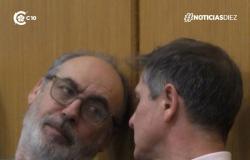Noam Chomsky is 95 years old and was discharged from a hospital in São Paulo, Brazil. He is a professor emeritus in the Department of Linguistics and Philosophy at MIT, a political activist, and one of the most influential critics of American foreign policy.
Photo: EFE – Francisco Guasco
The US wars in Latin America between 1960 and 1990, their horrors aside, have had long-lasting historical significance. To address only one important aspect, they were, to no small extent, wars against the Catholic Church, carried out to crush a terrible heresy proclaimed at the Second Vatican Council in 1962 (The news: the president of Brazil, Luis Inacio Lula, visited Noam Chomsky).
At that time, in the words of the distinguished theologian Hans Küng, Pope John XXIII “led to a new era in the history of the Catholic Church” as he restored the teachings of the Gospels, which had been set aside in the 4th century, when Emperor Constantine established Christianity as the religion of the Roman Empire and instituted “a revolution” that turned “the persecuted Church” into a “persecuting Church.” The heresy of Vatican II was accepted by the Latin American bishops, who adopted the “preferential option for the poor.” Priests, nuns, and lay people then brought the radical pacifist message of the Gospels to the poor, helping them organize to improve their bitter lot in the realms of Washington power.
That same year, 1962, President John F. Kennedy made several critical decisions. One was to shift the mission of Latin American armies from “hemispheric defense” (an anachronism since World War II) to “internal security”; In practice, a war against the population if it ever raised its head. Charles Maechling Jr., who directed counterinsurgency and internal defense planning from 1961 to 1966, describes the unsurprising consequences of the 1962 decision as a move away from tolerance of the “voracity and cruelty of Latin America’s armed forces.” to “direct complicity” in their crimes and the United States’ support for “the methods of Heinrich Himmler’s extermination brigades.”
A key initiative was the military coup in Brazil, backed by Washington and carried out shortly after Kennedy’s assassination, which instituted a murderous and brutal national security situation there. The plague of repression spread throughout the hemisphere, and came the 1973 coup that installed the Pinochet dictatorship in Chile and, later, the most brutal of all, the Argentine dictatorship, Ronald Reagan’s favorite regime in Latin America. Central America’s turn—although not for the first time—came in the 1980s under the leadership of the “gentle and friendly ghost” of scholars at the Hoover Institution, now admired for its successes.
The murder of Jesuit intellectuals as the Berlin Wall fell was a final blow to defeat the heresy of liberation theology, the culmination of a decade of horror in El Salvador, which began with the murder, by the same hands , by Archbishop Óscar Romero, the “voice of the voiceless.” The victors in the war against the Church proudly declared their responsibility. The School of the Americas (later renamed), famous for its training of Latin American assassins, announced as one of its “discussion topics” that the liberation theology initiated at Vatican II “was defeated with the help of the United States army.” ».
In reality, the November 1989 murders were almost a final blow; still more effort was needed. A year later, Haiti held its first free elections and, to the surprise and stupefaction of Washington—which had anticipated an easy victory for its own candidate, chosen from among the privileged elite—the people organized in the poor neighborhoods and in the mountains elected Jean-Bertrand Aristide, a popular priest, committed to liberation theology.
The United States quickly began to undermine the elected government and, after the military coup that overthrew it a few months later, provided substantial support to the brutal military junta and its elite supporters who seized power. Trade with Haiti increased, violating international sanctions, and increased even more under President Clinton, who also authorized the Texaco oil company to supply the murderous rulers, defying his own directives.
I will skip the shameful aftermath, widely studied elsewhere, except to note that in 2004 Haiti’s two traditional torturers, France and the United States, joined by Canada, intervened by force again, kidnapping President Aristide (who had been elected again) and was sent to central Africa. Aristide and his party were then effectively banned in the 2010-2011 election sham, the most recent episode in a horrendous story that dates back hundreds of years and is barely known among those responsible for the crimes, who prefer tales of selfless efforts to save people who suffer from their disastrous destiny.
Another catastrophic decision by Kennedy in 1962 was to send a Special Forces mission, led by General William Yarborough, to Colombia. Yarborough advised Colombian security forces to carry out “paramilitary, sabotage or terrorist activities against known communist supporters,” activities that “should be supported by the United States.”
The meaning of the expression “communist supporters” was explained by the respected president of the Permanent Committee for the Defense of Human Rights in Colombia, who was also Minister of Foreign Affairs, Alfredo Vázquez Carrizosa, who wrote that the Kennedy Administration “did a lot of effort to transform our regular armies into counterinsurgency brigades, accepting the new strategy of death squads”, giving rise to: what in Latin America is known as the national security doctrine […] [que no es una forma de] defense against an external enemy, but a way to make military institutions the lords of the game […].
The right to combat the internal enemy, as established in Brazilian doctrine, Argentine doctrine, Uruguayan doctrine and Colombian doctrine, is the right to combat and exterminate social workers, union members, men and women who do not support the established power. and that they are supposed to be extremist communists. And this could mean anyone, including human rights activists like myself.
Vázquez Carrizosa was living under heavy guard at his Bogotá residence when I visited him in 2002 as part of a mission from Amnesty International, which was launching its year-long campaign to protect human rights defenders in Colombia in response to the horrifying history of attacks against human rights activists, trade unionists and the usual victims of the State of terror: the poor and defenseless.
Chemical warfare (“fumigation”) in rural areas was added to the terror and torture in Colombia under the pretext of the war on drugs, which led to misery and a huge exodus of survivors to the urban suburbs. Colombia’s attorney general’s office now estimates that more than one hundred and forty thousand people have been killed by paramilitaries, who often acted in close collaboration with the US-funded military.
There are signs of carnage everywhere. In 2010, on a nearly impassable dirt road leading to a remote town in southern Colombia, my companions and I passed a small clearing with many simple crosses marking the graves of victims of a paramilitary attack on a local bus. The crime reports are graphic enough; The time we spend with the survivors, who are among the kindest and most compassionate people I have ever had the privilege of knowing, makes the image more graphic and more painful.
This is but a brief outline of terrible crimes, for which Washington bears a substantial share of the blame, that we could have easily prevented. But it is more gratifying to enjoy praise for courageously protesting the abuses of official enemies: it is a good deed, but nothing to do with the priority of an intellectual who is governed by values and who takes seriously the responsibility of that position.
Within our domains of power, unlike those of enemy countries, victims are not only overlooked and quickly forgotten, but also cynically insulted. A striking example of this occurred within weeks of the murder of Latin American intellectuals in El Salvador, when Vaclav Havel visited Washington and addressed a joint session of Congress. To his rapt audience, Havel praised the “defenders of liberty” in Washington, who “understood the responsibility that comes from being the most powerful nation on earth”; significantly, their responsibility for the brutal murder of their Salvadoran counterparts shortly before. The liberal intellectual class was captivated by his speech. Anthony Lewis argued enthusiastically in The New York Times that Havel has reminded us that “we live in a romantic age.”
Other prominent liberal commentators reveled in the “idealism, irony and humanity” [de Havel] “by preaching a doctrine of the cult of individual responsibility,” while Congress “obviously shuddered with respect” for his genius and integrity, and wondered why the United States lacks intellectuals who, like him, “put morality before personal interest”. There is no need to dwell on what the reaction would have been if the elite forces armed and trained by the Soviet Union had murdered Havel and half a dozen of his colleagues, which was, of course, inconceivable, and Father Ignacio Ellacuría, the most prominent of the murdered Jesuit intellectuals, would have uttered the same words in the Duma.
Since we can barely see what is happening before our eyes, it is not surprising that events happening at a slight distance are completely invisible.
* It is published with authorization from Penguin Random House Grupo Editorial. Noam Chomsky is the author of numerous political works, including the best sellers Hegemony or Survival (2004), Failed States (2007) and Who Rules the World? (2016).






